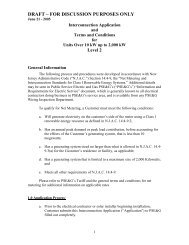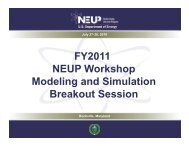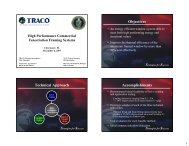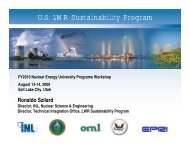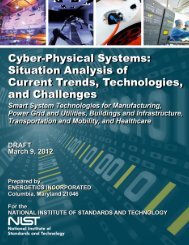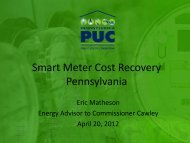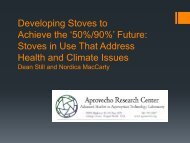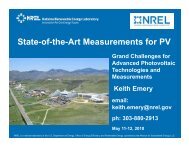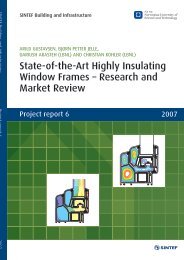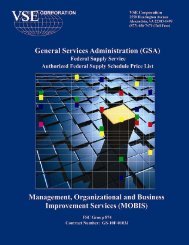Basic Research Needs for Geosciences - Energetics Meetings and ...
Basic Research Needs for Geosciences - Energetics Meetings and ...
Basic Research Needs for Geosciences - Energetics Meetings and ...
- No tags were found...
Create successful ePaper yourself
Turn your PDF publications into a flip-book with our unique Google optimized e-Paper software.
INTRODUCTIONRecommendations of priority research directions <strong>and</strong> long-term gr<strong>and</strong> challenges <strong>for</strong> thegeosciences were developed.The workshop was sponsored by the DOE Office of <strong>Basic</strong> Energy Sciences (BES). It follows the<strong>for</strong>mat of several previous BES workshops that dealt with other important aspects of energyfutures. Those workshops examined overall energy challenges during “<strong>Basic</strong> <strong>Research</strong> <strong>Needs</strong> toEnsure a Secure Energy Future” (October 2002), the production, storage, <strong>and</strong> use of hydrogenduring “<strong>Basic</strong> <strong>Research</strong> <strong>Needs</strong> <strong>for</strong> the Hydrogen Economy” (May 2003), “<strong>Basic</strong> <strong>Research</strong> <strong>Needs</strong><strong>for</strong> Solar Energy Utilization” (April 2005), “<strong>Basic</strong> <strong>Research</strong> <strong>Needs</strong> <strong>for</strong> Superconductivity” (May2006), “<strong>Basic</strong> <strong>Research</strong> <strong>Needs</strong> <strong>for</strong> Solid-State Lighting” (May 2006), <strong>and</strong> “<strong>Basic</strong> <strong>Research</strong> <strong>Needs</strong><strong>for</strong> Advanced Nuclear Energy Systems” (August 2006). Reports from those <strong>and</strong> relatedworkshops are available on the BES web site at http://www.sc.doe.gov/bes/reports/list.html.The workshop included 127 invited attendees from U.S. universities, national laboratories, <strong>and</strong>government agencies, as well as representatives of academia, industry <strong>and</strong> government from<strong>for</strong>eign countries. The report was prepared by the 84 members of five topical panels. Theworkshop program <strong>and</strong> attendee list are provided in Appendices 2 <strong>and</strong> 3.A plenary session covered the technology needs <strong>and</strong> the basic research challenges <strong>for</strong> geoscienceneeded to support prediction of the behavior of geologic storage systems. The workshop thendivided into four panels that investigated specific areas in more detail:• Multiphase Fluid Transport in Geologic Media• Chemical Migration Processes in Geologic Media• Subsurface Characterization• Modeling <strong>and</strong> Simulation of Geologic SystemsIn addition, a separate panel considered crosscutting research issues <strong>and</strong> gr<strong>and</strong> challenges. Thepanels included research leaders in the specific areas from universities, national labs, <strong>and</strong> otherinstitutions. Other participants included observers from assorted government agencies, whorotated among the various panel sessions. Participants received in advance a documentdescribing current technology perspectives <strong>and</strong> applied research needs. That document (theTechnical Perspectives Resource Document) is provided in Appendix 1. The panels were askedto consider the gaps in current knowledge, opportunities <strong>for</strong> significant advances in basicknowledge with a pathway <strong>for</strong> impact on geoscience in general, as well as the potential <strong>for</strong>impact on uses of geoscience to support future energy technologies. Each panel recommended aset of priority research directions to address these opportunities <strong>and</strong> challenges to the assembledparticipants at a final plenary session at the end of the workshop.This report was prepared by core writing teams from the Multiphase Fluid Transport, ChemicalMigration, Characterization, Modeling, <strong>and</strong> Crosscutting panels. Their reports outline in detailthe research needs <strong>and</strong> the scientific issues that will have to be addressed systematically. Therecommendations of those panels are summarized in four Panel Reports, three Gr<strong>and</strong> Challenges,six Priority <strong>Research</strong> Directions, <strong>and</strong> three Crosscutting Issues. Taken together, theserecommendations outline a program of geoscience research that will be of critical importance <strong>for</strong>the energy transitions that will take place in this century.4 <strong>Basic</strong> <strong>Research</strong> <strong>Needs</strong> <strong>for</strong> <strong>Geosciences</strong>: Facilitating 21 st Century Energy Systems




